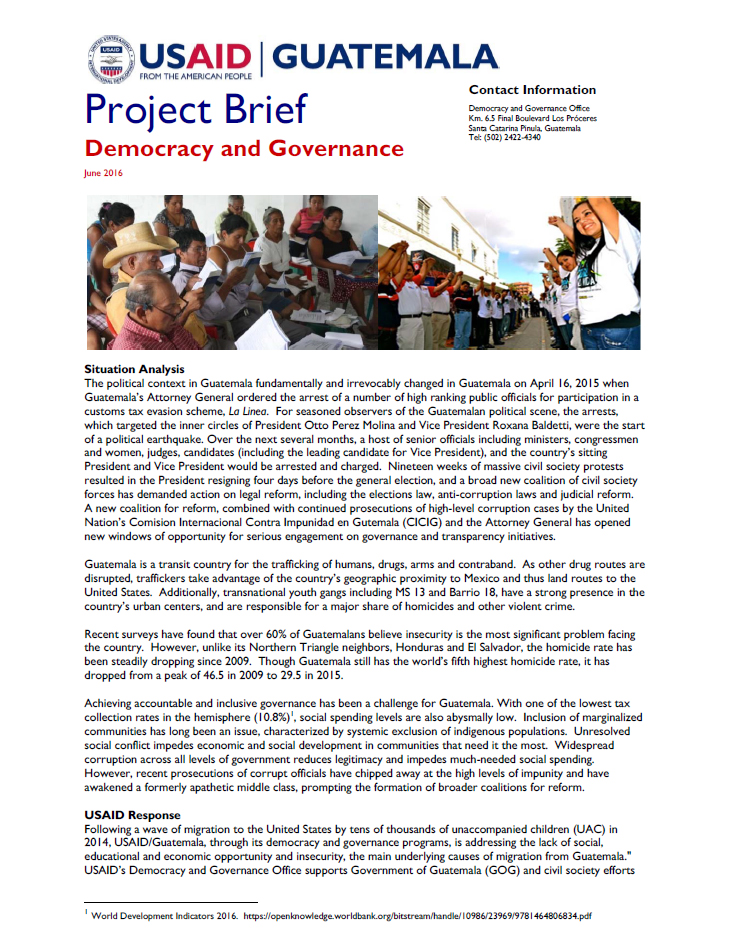Situation Analysis
Sector Brief - Democracy and Governance ![]() (pdf - 148k)
(pdf - 148k)
Guatemala’s 36-year internal armed conflict was the longest, most violent conflict in Central America and resulted in more than 200,000 casualties and rampant violations of human rights. The signing of the Peace Accords in December 1996 brought the conflict to an official end and marked the emergence of a civil society sector that strongly advocates for needed reforms. Still, the country’s democracy remains fragile and some governmental institutions are weak. Furthermore, democracy and rule of law are threatened due to limited state capacity to control violence and crime, which have reached historically high levels over the past decade.
Guatemala is a transit country for the trafficking of humans, drugs, arms, and contraband. As other drug routes are disrupted, traffickers take advantage of the country’s geographic proximity to Mexico and land routes to the United States. Additionally, youth gangs have grown and are responsible for a large share of violent crime in urban areas.
Recent surveys have found that over 60% of Guatemalans believe that insecurity is the most significant problem facing the country. Homicide rates have remained above 34 per 100,000 for the past decade and 33% of households (43% in urban areas) were victims of crime in 2012.
USAID's Response
USAID supports the Government of Guatemala and civil society efforts to achieve greater security and justice for the country’s citizens and works to improve the effectiveness and efficiency of institutions that work on security and justice issues. Specifically, USAID seeks to reduce levels of violence in target communities facing high crime rates and strengthen the prosecution and adjudication of crime.
- In close cooperation with Guatemala’s Attorney General’s Office and other government institutions, USAID has established new types of courts to meet the judicial needs of Guatemalans.
- USAID established and continues to support six 24-Hour Courts where judges are available 24 hours a day to comply with Guatemala’s constitutional mandate to present a detainee to a judge within six hours of arrest. These courts also allow prosecutors to request court orders for wiretapping and search warrants around the clock. USAID launched and supports a specialized 24-Hour Court for Violence against Women and Sexual Exploitation to ensure victims receive the assistance they need and to strengthen criminal investigation using scientific evidence.
- USAID supported the Guatemalan government in establishing a High Impact Court to provide greater security for Guatemala’s justice sector personnel and resolve some of the most risky cases involving gangs, narcotrafficking, transitional justice, and high-level official corruption that in the past would not have made it through the justice system.
- Most recently, USAID supported the Supreme Court in the establishment of a Pluripersonal Criminal Court where minor felonies with sentences of up to five years are tried. This new court relieves pressure from the over-burdened First Instance Criminal Courts.
- In addition, USAID helps promote accountability and good governance of institutions that work on security and justice issues.
- USAID works to bring the financial and administrative management procedures in security and justice sector institutions up to international standards, thereby contributing to long term institutional efficiency and effectiveness.
- USAID works to decrease the vulnerability of at-risk communities to gangs and organized criminal groups, improve trust between police and communities, and increase civic responsibility.
- USAID’s programs reduce the vulnerability of at-risk youth by providing educational and vocational training as well as recreational and cultural activities.
- In coordination with the municipalities and police, USAID assists citizen groups to map neighborhood vulnerabilities and develop prevention plans to reduce crime.
- USAID also helped support the creation of a community-based policing degree program for the National Police Academy and provided assistance on a public policy on violence prevention.
- USAID has supported transitional justice related to crimes committed during the internal armed conflict.
- USAID, under a multi-donor funded agreement with the United Nations Development Programme, supported the advancement of several paradigmatic human rights cases, including historic sentences in the 1982 Dos Erres massacre.
- USAID has also strengthened the Guatemalan Attorney General’s Human Rights Unit, which is responsible for the criminal prosecution of paradigmatic cases on human rights violations associated with the internal armed conflict.
- USAID also supported civil society organizations on the exhumation of victims’ remains from the conflict, used to support prosecutions, and supported the establishment of historic memorials such as the Rabinal Community Museum.
- In response to the needs of Guatemalan migrants returning from the United States, USAID provided reintegration services to returnees, including transportation to their communities, free phone calls, and job training.
Principal Results and Accomplishments
USAID’s efforts have resulted in:
- Reduced levels of violence – Communities targeted by USAID reported an 18% decline in robberies, a 50% decline in illegal drug sales, and a 50% decline in extortion and blackmail.
- Increased efficiency of Guatemalan courts – The 24-Hour Courts have reduced the number of cases dismissed for lack of merit from 77% to less than 15%. In 2013, the Pluripersonal Court resolved 4,342 cases, representing an increase of over 400%, dramatically improving system efficiency.
- Support for combatting gender-based violence – In 2013, USAID supported 18,451 women victims of violence, including domestic violence, through the implementation of key legislation and successful operation of the specialized 24-Hour Court for Violence against Women and Sexual Exploitation.
- Assistance for Guatemalan returnees – In 2013, USAID provided assistance to approximately 40,000 Guatemalan returnees including psychosocial support, transport to home communities, and job training.
Related Links
USAID Helps to End Corruption in Guatemala
Blog: Openly LGBTI and in Office: A Historic Election for Guatemala
Blog: How Guatemala’s Justice System Became Strong Enough to Prosecute Corruption
Blog: Fostering a Sense of Belonging Key in Preventing Youth Violence
Blog: Refurbished Police Stations Mean Happy Cops, Better Cops in Guatemala
Blog: 24-hour Courts Changing Women's Access to Justice









Comment
Make a general inquiry or suggest an improvement.